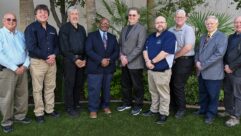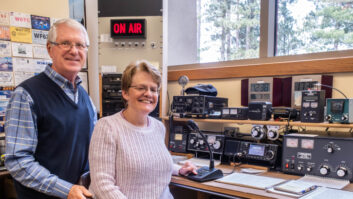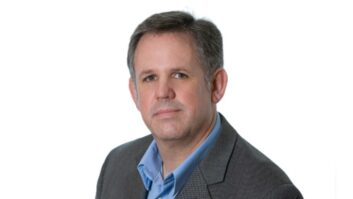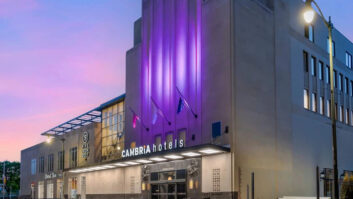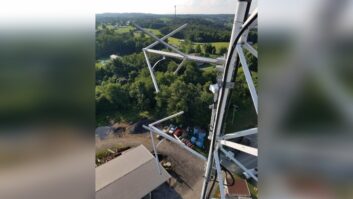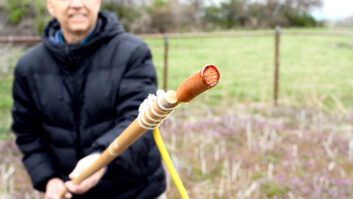WDTW “La Z 1310 AM” is a 5 kW station serving the Detroit area with regional Mexican programming. In addition to a now-distant history as “Keener 13,” the station has an unusual and more recent story.
In 2012, Clear Channel donated the station’s frequency and land to a Minority Media and Telecommunications Council ownership diversity initiative. Its existing six-tower AM array was dismantled. Some two years later, MMTC sold WDTW at a discounted “incubator” price to Hispanic entrepreneur and broadcaster Pedro Zamora.
He had started out in the restaurant business in the 1980s, then expanded by converting adjacent space into a banquet hall providing music and entertainment on a weekly basis. His Zamora Entertainment, based in Detroit, today oversees operations at eight venues and three radio stations.

Taking on ownership of WDTW, the company rebuilt its towers and installed new studios. It hired a new staff and launched a Spanish-language format. This summer it added an FM translator on 107.9, further increasing its presence in Detroit.
This interview, part of a series of occasional MMTC commentaries in Radio World, is with Daniela Zamora, station vice president/general manager and daughter of Pedro Zamora. She also oversees administrative operations of Zamora Entertainment and operation of four of its venues. The interview was conducted by Suzanne Gougherty, director, MMTC Media and Telecom Brokers, and Stephanie M. Martin-Thom, MMTC Cathy Hughes Fellow.
MMTC: Why did Zamora Entertainment want to enter the Detroit broadcasting market?
Daniela Zamora: My father did a short radio show 18 years ago, and we have a concert venue there. So it went hand in hand with the next phase in terms of growth.
Detroit is the 12th market and a very significant major metro market with no formidable media outlet for Mexican Americans. There has been internet radio and another small AM station there, but that station did not have a signal in Detroit, which is where the majority of the Hispanic population lives and works. We really wanted to provide a good full-coverage station because there was a void in the market serving the Mexican American population. We did it with a sense of serving our community and also that it would be a financially smart move. We soon realized the commitment and sacrifice it takes to run a large station in a large market.
MMTC helped up with that opportunity; and it is a great station that covers the entire metropolitan area. The signal reaches into Toledo, Ohio; past Pontiac; almost seven counties. It is a way to reach all our customers; it complements the other businesses that we have and seemed like a natural move to make to continue growth.
MMTC: Mr. Zamora accepted the Entrepreneur of the Year Award at the MMTC Access to Capital and Telecom Policy Conference in July. In his speech he explained that it took a year to get the station going because of repairs that needed to be made. Can you talk about what it took to get the station off the ground?
Zamora: Before we even started construction, we had to go through the permitting stage with the FCC, review old engineering blueprints to make sure that the station would not interfere with other signals in the area, and then submit that to the FCC for approval, which is a process in of itself because of regulations. Some of these regulations, you don’t understand all the technical aspects; that’s why we rely on the broadcast engineers.
Luckily the bases and ground systems for the towers were intact. We had to rebuild the six towers. There were things we could salvage, which did alleviate some expenses. Luckily what was left we could still use. We had to buy a new transmitter. After that was completed, next was the addition of our current building, where we constructed a brand-new radio studio, along with a full production studio.
Clarence Beverage of Communications Technologies Inc. led the engineering and FCC studies, Mike Vanhooser of Nova Electronics led the building of the tower site, bringing in Steve Benzer of Expert Broadcast Electronics for the studio buildout.
MMTC: How many employees work for La Z?
Zamora: We have eight full-time employees. Three in sales, three on-air talent, one programmer, plus me, along with an outside contractor who does our traffic logs.
MMTC: As vice president and general manager, what has been your biggest challenge?
Zamora: Developing a structure for each department. We really put an emphasis on the sales department. Plus hiring the right employees who were familiar with the Spanish market. We wanted to make sure we were delivering a strong program that would resonate in the Hispanic community here in Detroit. So far, we have been able to find and keep good sales executives.
MMTC: How do you like your new position so far?
Zamora: It is a very rewarding job, knowing you are providing music, news and information in Spanish to an under-served community in Detroit.
MMTC: Has your father helped you with the running of the station?
Zamora: He is always there for me when it comes to processes and procedures. And he was heavily involved with formatting the station’s live dayparts. He has a keen knowledge of the Mexican music genre because of his long history working as an entrepreneur in the music industry. He is there when I need him, but pretty much I’m in charge of the day-to-day operations.
MMTC: Has it been hard to attract a customer base; or was the base there and it’s just a matter of getting them acquainted with WDTW?
Zamora: Yes the customer base is there — although because we do find that there are two very different audiences groups, a traditional audience and the new younger, millennial audience. We have to find a way to appeal to both.
The audience in metro Detroit is substantial and we have gotten a great response. For example in May we had our first St. Jude’s promotion and broke all records; the station and our on-air talent raised $50,000. We beat all the first-time radio stations in the state of Michigan. St. Jude had a goal of $20,000 and we not only met that but surpassed it by leaps. Our listeners out-deliver, and that makes us proud to be broadcasting to the Mexican American population who live in metro Detroit.
We did another promotion that is similar to a cotillion or “Sweet 16,” called a quinceñera for 15-year-old girls. We did 15 quinceñera; we called it quince-quinceñera. It is basically for girls anywhere from 15 to 18 years old who did not get to have their cotillion. We produce the entire event, from the church ceremony to limo rides, pictures, cakes and much more; it is a rite-of-passage celebration. We secured sponsors for all aspects, from the venue, music, photographers, videos, food, dresses, shoes, make-up from many diverse companies in the Metro Detroit community. It was really great promotion for the station, the community and our sponsors. We attracted a thousand people, it again was over-delivery, many more than we expected.
We have a mobile app so we’re able to get people to listen to us from outside the Detroit area. We have some people listening to us from Guatemala and El Salvador; so our AM station is having an impact on Detroit as well in other states and countries. Even for the St. Jude’s promotion we had some people donating from Texas, California, Chicago and Nebraska. I like to think that we have some presence through our entertainment venues in those states because I am just amazed when you see those demographics and where that listenership is coming from, the results that you can obtain. It’s this kind of turnout that continues to motivate us and pushes us forward.
MMTC: What was it like growing up in a family of entrepreneurs?
Zamora: Part of it is a lot of pressure, big shoes to fill. But it is also very encouraging because when you have ideas to share, you have a very supportive environment to brainstorm, to suggest tips and other obstacles to watch out for. At the same time that there is pressure, there is comfort, because you have a family team that you can rely on.
MMTC: When you were growing up, did you participate in entrepreneurial activities of your own, separate from what your parents did?
Zamora: Not necessarily on my own. It was more assisting my parents in further developing the company and helping them with their jobs. Along with my brother, we especially had a lot to do with technology and the resources that were available, because everything was coming up on computers as opposed to the traditional paper/pen. So there were many ways we could help to improve our workload in a much more efficient style with the new resources that were available. They were used to running the business pushing papers, so we were helpful to them with technology.
MMTC: Why did you decide to work with Zamora Entertainment; did you have a different perspective of where you wanted to go with your professional career?
Zamora: I always saw myself going to law school. I did get my graduate degree in sociology from the University of Michigan, with a plan on going to law school when I finished; however, I got married and had three kids; it was a little bit of a struggle because I had always worked for our family business since I was 16.
I didn’t want to do a couple classes here or there with regards to law school. It is still on my to-do list. I still have little ones in school but I am hoping to circle back to law school next year.
Zamora Entertainment has grown so much that it has been one project after the other, which has been keeping all of us very busy. My hope is that next year that I will be able to delegate a little bit more.
The radio station is still very new and there is a lot of foundation still to be created in terms of policy and procedures. Because we are airing a Spanish-language format, we still have a little bit more to do with regards setting up those policies and procedures, trying to reflect how radio stations operate in a major market. Our advertising clients are growing, so we need to keep pace with what they need and want.
We are trying to find that happy medium.




